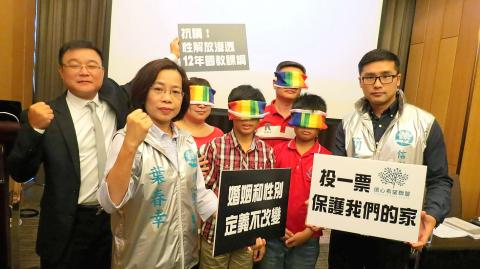When it was announced that Democratic Progressive Party (DPP) Chairperson Tsai Ing-wen (蔡英文) won the presidential election last month, supporters crowded her national campaign headquarters in celebration.
In addition to being elected Taiwan’s first female president, Tsai’s victory is especially significant for the country’s lesbian, gay, bisexual and transgender (LGBT) community. Unlike other candidates and all former presidents, she will be the first Taiwanese president ever to publicly support same-sex marriage.
A NEW PRESIDENT

Photo courtesy of Tsai Ing-wen’s national campaign headquarters
Tsai’s LGBT-friendly position was summed up last month in a headline by news outlet Quartz: “Taiwan’s new president is a female academic who loves cats and supports gay rights.” Before the Taiwan LGBT Pride Parade in Taipei last year, she publicly declared support for marriage equality to boost parade’s visibility and momentum. With her popularity and influence, Tsai should make a positive impact on Taiwan’s gay rights movement.
It would be naive, however, to view Tsai’s victory as a panacea for the LGBT community. In light of the fact that DPP caucus whip Ker Chien-ming (柯建銘), as well as some DPP legislators, has repeatedly blocked a draft bill for marriage equality, it is hardly surprising that the Collective of Sex Workers and Supporters (日日春關懷互助協會) asked: “Does Tsai really speak for the DPP [on the issue]?”
Tsai has also been called “water spinach” ( 空心菜, kongxincai), a hollow-stemmed vegetable, for failing to propose substantial policy ideas (“Tsai” is homophonous with cai, 菜, vegetable). Though the transition of executive power doesn’t take place until May, she has yet to propose any concrete LGBT policies, so the gay community should not soley rely on her support.

photo: Su Ching-feng, Taipei Times
A NEW PARTY
The legislative election was held on the same day as the presidential election. The emergence of the Faith and Hope League (信心希望聯盟, FHL) party reveals how contentious marriage equality remains in Taiwan. Unlike other parties, the FHL ran on a conservative platform that specifically targeted LGBT rights.
The party was established in September of last year for the purpose of building a “Christian political platform.” But the eight legislative candidates it nominated failed to gain any seats, receiving 1.7 percent of the vote — a low figure, but suggests that there is still significance opposition to the idea.
During its campaign, the FHL pledged to protect “traditional family values” by pushing for a referendum against the legalization of same-sex marriage. With the help of Christian teachers, it controversially distributed petitions to elementary and secondary school students, who were told to have their parents sign the forms.
For example, the student bulletin of National Taichung Girls’ Senior High School (台中女中) reported last month that members of the FHL were distributing petitions at the school’s sports games, warning students not to be brainwashed by LGBT people.
“Taiwan is a free and democratic society, and Taiwanese enjoy the freedom of expression and the right to participate in politics through referenda,” the bulletin stated. “But it is outrageous when the right is misused to oppress others,” raising the question of who is being oppressed?
A NEW LEGISLATURE
In another sign that there is still much that needs to be done for LGBT rights, 12 legislators, including Chinese Nationalist Party (KMT) legislator Lu Hsueh-chang (呂學樟), a former Judiciary Committee convener who said that homosexuals are “scary” and that legalizing same-sex marriage is encouraging “bestiality,” stood for the election. Although they failed to be nominated or reelected, they are still on the political scene.
However, today close to 40 of Taiwan’s 113 legislators support same-sex marriage — a new high. This means that the LGBT community may have a better chance to put the draft bill for marriage equality on the legislative agenda in the new legislature.
Despite continued opposition to gay rights, it is encouraging to see an LGBT-friendly president and legislature. With the victory in both the presidential and legislative elections, perhaps Taiwan’s LGBT community will finally achieve the same rights they have been denied for so long.

Towering high above Taiwan’s capital city at 508 meters, Taipei 101 dominates the skyline. The earthquake-proof skyscraper of steel and glass has captured the imagination of professional rock climber Alex Honnold for more than a decade. Tomorrow morning, he will climb it in his signature free solo style — without ropes or protective equipment. And Netflix will broadcast it — live. The event’s announcement has drawn both excitement and trepidation, as well as some concerns over the ethical implications of attempting such a high-risk endeavor on live broadcast. Many have questioned Honnold’s desire to continues his free-solo climbs now that he’s a

Francis William White, an Englishman who late in the 1860s served as Commissioner of the Imperial Customs Service in Tainan, published the tale of a jaunt he took one winter in 1868: A visit to the interior of south Formosa (1870). White’s journey took him into the mountains, where he mused on the difficult terrain and the ease with which his little group could be ambushed in the crags and dense vegetation. At one point he stays at the house of a local near a stream on the border of indigenous territory: “Their matchlocks, which were kept in excellent order,

Jan. 19 to Jan. 25 In 1933, an all-star team of musicians and lyricists began shaping a new sound. The person who brought them together was Chen Chun-yu (陳君玉), head of Columbia Records’ arts department. Tasked with creating Taiwanese “pop music,” they released hit after hit that year, with Chen contributing lyrics to several of the songs himself. Many figures from that group, including composer Teng Yu-hsien (鄧雨賢), vocalist Chun-chun (純純, Sun-sun in Taiwanese) and lyricist Lee Lin-chiu (李臨秋) remain well-known today, particularly for the famous classic Longing for the Spring Breeze (望春風). Chen, however, is not a name

Lines between cop and criminal get murky in Joe Carnahan’s The Rip, a crime thriller set across one foggy Miami night, starring Matt Damon and Ben Affleck. Damon and Affleck, of course, are so closely associated with Boston — most recently they produced the 2024 heist movie The Instigators there — that a detour to South Florida puts them, a little awkwardly, in an entirely different movie landscape. This is Miami Vice territory or Elmore Leonard Land, not Southie or The Town. In The Rip, they play Miami narcotics officers who come upon a cartel stash house that Lt. Dane Dumars (Damon)